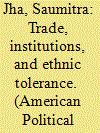| Srl | Item |
| 1 |
ID:
118978


|
|
|
|
|
| Publication |
2012.
|
| Summary/Abstract |
Can combat experience foster organizational skills that engender political collective action? We use the arbitrary assignment of troops to combat in World War II to identify the effect of combat experience on two channels that change local ethnic composition and future political control: ethnic cleansing and co-ethnic immigration. During the Partition of South Asia, we find that ethnically mixed districts whose veterans were exposed to greater combat exhibited greater co-ethnic immigration and minority ethnic cleansing, with minority out-migration achieved with lower loss-of-life. Further, where ethnic groups had been in complementary economic roles or the minority received greater combat experience, there was less ethnic cleansing. We interpret these results as reflecting the strategic role of ethnic cleansing and co-ethnic immigration by groups seeking political control and the role of combat experience in enhancing organizational skills at credibly threatening violence and engaging in collective action.
|
|
|
|
|
|
|
|
|
|
|
|
|
|
|
|
| 2 |
ID:
127835


|
|
|
|
|
| Publication |
2013.
|
| Summary/Abstract |
I provide evidence that the degree to which medieval Hindus and Muslims could provide complementary, nonreplicable services and a mechanism to share the gains from exchange has resulted in a sustained legacy of ethnic tolerance in South Asian towns. Due to Muslim-specific advantages in Indian Ocean shipping, interethnic complementarities were strongest in medieval trading ports, leading to the development of institutional mechanisms that further supported interethnic exchange. Using novel town-level data spanning South Asia's medieval and colonial history, I find that medieval ports, despite being more ethnically mixed, were five times less prone to Hindu-Muslim riots between 1850 and 1950, two centuries after Europeans disrupted Muslim overseas trade dominance, and remained half as prone between 1950 and 1995. Household-level evidence suggests that these differences reflect local institutions that emerged to support interethnic medieval trade, continue to influence modern occupational choices and organizations, and substitute for State political incentives in supporting interethnic trust
|
|
|
|
|
|
|
|
|
|
|
|
|
|
|
|